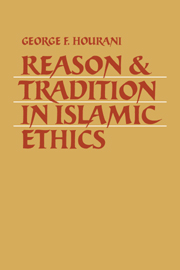Book contents
- Frontmatter
- Contents
- Preface
- Foreword by Michael Marmura
- Conventions
- Titles and locations of the original articles
- Introduction
- 1 Islamic theology and Muslim philosophy
- 2 Ethics in classical Islam: a conspectus
- 3 Ethical presuppositions of the Qurʾān
- 4 ‘Injuring oneself’ in the Qurʾān, in the light of Aristotle
- 5 Two theories of value in early Islam
- 6 Islamic and non-Islamic origin of Muʿtazilite ethical rationalism
- 7 The rationalist ethics of ʿAbd al-Jabbār
- 8 Deliberation in Aristotle and ʿAbd al-Jabbār
- 9 Ashʿarī
- 10 Juwaynī's criticisms of Muʿtazilite ethics
- 11 Ghazālī on the ethics of action
- 12 Reason and revelation in Ibn Ḥazm's ethical thought
- 13 The basis of authority of consensus in Sunnite Islam
- 14 Ibn Sīnā's ‘Essay on the secret of destiny’
- 15 Averroes on good and evil
- 16 Combinations of reason and tradition in Islamic ethics
- Select bibliography
- Index
13 - The basis of authority of consensus in Sunnite Islam
Published online by Cambridge University Press: 13 October 2009
- Frontmatter
- Contents
- Preface
- Foreword by Michael Marmura
- Conventions
- Titles and locations of the original articles
- Introduction
- 1 Islamic theology and Muslim philosophy
- 2 Ethics in classical Islam: a conspectus
- 3 Ethical presuppositions of the Qurʾān
- 4 ‘Injuring oneself’ in the Qurʾān, in the light of Aristotle
- 5 Two theories of value in early Islam
- 6 Islamic and non-Islamic origin of Muʿtazilite ethical rationalism
- 7 The rationalist ethics of ʿAbd al-Jabbār
- 8 Deliberation in Aristotle and ʿAbd al-Jabbār
- 9 Ashʿarī
- 10 Juwaynī's criticisms of Muʿtazilite ethics
- 11 Ghazālī on the ethics of action
- 12 Reason and revelation in Ibn Ḥazm's ethical thought
- 13 The basis of authority of consensus in Sunnite Islam
- 14 Ibn Sīnā's ‘Essay on the secret of destiny’
- 15 Averroes on good and evil
- 16 Combinations of reason and tradition in Islamic ethics
- Select bibliography
- Index
Summary
The primary doctrine of consensus (ijmāʿ) in Sunnite Islam is simply this: that the unanimous opinion of the Sunnite community in any generation on a religious matter constitutes an authority (ḥujja), and ought to be accepted by all Muslims in later times. The importance of the doctrine in theory and practice was recognized particularly in classical Islam, and has been much emphasized, and in some respects exaggerated, by modern orientalists since the studies of Snouck Hurgronje (see § 17).
This being so, it was natural that serious thought should be given to the fundamental question: ‘What is the basis on which this authority of consensus rests?’ Or, what facts about Islam and the world legitimize it? This is the question known in Arabic as ḥujjīyat al-ijmāʿ, ‘the authoritativeness of consensus’. Much was written about it in classical Islam, as we shall see, and more variety has been added by modern Muslims. We should also expect to find some extensive historical study of the question by modern orientalists. But what has been written has generally been too brief, forming a part of a wider survey of Islamic consensus, or of Islamic law as a whole. The question has usually been thought to have been sufficiently dealt with by quoting the famous Tradition: ‘My Community does not agree on an error’, which was the major basis accepted for a thousand years.
- Type
- Chapter
- Information
- Reason and Tradition in Islamic Ethics , pp. 190 - 226Publisher: Cambridge University PressPrint publication year: 1985
- 1
- Cited by



